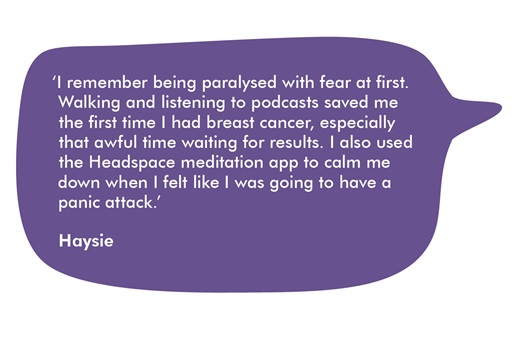To mark World Mental Health Day, content developer Azmina gives some tips for coping with panic attacks.
World Mental Health Day is held on 10 October every year. It aims to raise awareness of mental health problems around the world and is a good time to focus on your own well-being.
A common emotion when living with cancer is fear or anxiety. You may be frightened about your treatment or the future. Before a medical appointment or test, you may dread hearing bad news. Even if the cancer has been cured, you may feel anxious about it coming back. If you are very anxious, you may have a panic attack.
What is a panic attack?
A panic attack is an intense feeling of fear or anxiety that comes on suddenly. You may experience symptoms such as:
These symptoms can make you think that you are having a heart attack, losing control, going to collapse or even dying. They usually last from about 5 to 20 minutes and often peak within 10 minutes.
What causes a panic attack?
Having a panic attack is a frightening experience, but not dangerous or harmful. It is basically an exaggerated version of your body’s normal response to fear or stress.
When you think you are in danger, your body prepares either to fight or flee from the perceived threat. This is known as the ‘fight or flight’ response. You start to breathe quickly and take in more oxygen to fight or run away. The hormone adrenaline is released, which makes your heart beat faster and your muscles tense up.
Your body’s alarm system has been triggered, but it is a false alarm. A panic attack will not harm you and the symptoms always pass.
Tips for coping
Here are 5 tips for handling a panic attack:
Further support
For help in dealing with stress and anxiety, call the Macmillan Support Line free on 0808 808 00 00 (7 days a week, 8am to 8pm).
By joining the Macmillan Online Community, you can connect with others who are going through similar experiences. One of our Community members, Haysie, recently shared how she managed panic attacks after being diagnosed with breast cancer:
If you keep having panic attacks and find yourself worrying about when the next one may happen, speak to your doctor. They may prescribe medication to help control your anxiety and can arrange for you to have talking therapy. For example, Cognitive Behavioural Therapy (CBT) can challenge any negative thought patterns that are contributing to your panic attacks and teach you ways to stay calm.
For more tips on coping with panic attacks, you can order a free copy of Macmillan’s booklet How are you feeling? The emotional effects of cancer on our website.
You can also use our Directory of Information Materials for People Affected by Cancer. It has details of over 1,900 booklets, leaflets, books and audiovisual materials for people affected by cancer. It is regularly updated and you can use it to search for our resources and those from other organisations.
To see what else Macmillan's cancer information team has been blogging about, please visit our blog home page! You can subscribe to receive our blogs by email or RSS too.
We're with you every step of the way
The Macmillan team is here to help. Our cancer support specialists can answer your questions, offer support, or simply listen if you need a chat. Call us free on 0808 808 00 00.
Comments? Feel free to add them below (you need to be logged in).
Whatever cancer throws your way, we’re right there with you.
We’re here to provide physical, financial and emotional support.
© Macmillan Cancer Support 2026 © Macmillan Cancer Support, registered charity in England and Wales (261017), Scotland (SC039907) and the Isle of Man (604). Also operating in Northern Ireland. A company limited by guarantee, registered in England and Wales company number 2400969. Isle of Man company number 4694F. Registered office: 3rd Floor, Bronze Building, The Forge, 105 Sumner Street, London, SE1 9HZ. VAT no: 668265007